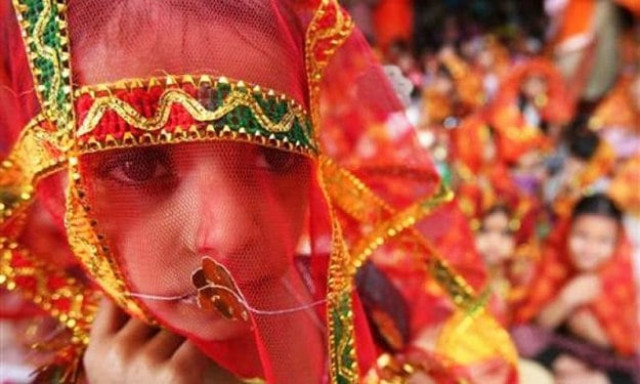Child Marriages - A Vicious Cycle of Poverty and Abuse
Awareness, education, and economic empowerment crucial for prevention

Despite being illegal, child marriages continue to affect millions of young lives, perpetuating cycles of poverty, gender bias, and inequality. According to a study, 18 percent of girls in Pakistan get married before the age of 18, leading to severe consequences on their health, education, and overall well-being.
This was revealed at The Express Tribune podcast hosted by Aisha Abrar, where Sumaira Ishfaq, social development advisor for Pathfinder International Pakistan, reflected on the growing menace of child marriage and called it not just a personal issue but a product of poverty. "Child marriage is not just a personal issue; we need to understand that it does not only affect the child victim but also the country's economy, its health and education systems, and the future generation."
Sumaira pointed out that patriarchal structure and preference for male children are primary factors driving child marriages. "The gender bias against the female child is the main factor behind child marriages," she explained. "Consider the words of prayers you get from the beggars at road intersections and traffic signals, 'May you get chand sa beta.’ This, Sumaira said, reflects the deeply rooted preference of our society for a male child."
Asked how climate change exacerbates the issue, the social development expert said, "Climate change worsens poverty and thus contributes to child marriages. Underprivileged areas with people who are vulnerable, have little access to education, resources, food, and protection, already have greater acceptability for child marriages, but with calamities like floods caused by climate change... the livelihood of the people and their source of income is adversely affected, prompting parents to marry off their daughters soon to lower the economic strains"
Host Aisha Abrar stressed the need for collective action, including measures to tackle poverty, spread awareness, and reduce gender bias. "We need to be reminded that though it is not possible for anyone to decide the gender of the baby, you are in great control about the course of life you provide to the child," she said.
Sumaira maintained that while awareness is crucial, it must be accompanied by concrete actions like providing girls with access to quality education and healthcare. "Awareness is the first and foremost point. When we talk about child marriages, the first thing we work on is awareness," she said. "In child marriages, girls as little as 12, 13, or 14 are the victims. A girl of this age does not even have a body prepared to bear a child. When such a girl reaches a level where a baby is born from her, a host of complications await her and the baby." She added that child marriages are relationships with chronic abuse, with the victim not even knowing that she has been and will continue to be sexually, physically, and emotionally abused throughout her life.
Highlighting initiatives of her organization, she said that Pathfinder International Pakistan has supported several community-led initiatives for awareness against child marriage, including a recent awareness ad campaign in which a 13-year-old girl is portrayed marrying a 56-year-old man, with the message against the potential catastrophe such a marriage may bring. "We must educate people in rural and urban settlements about the hazards of child marriages, convincing them that they are wrong in the first place. We must empower both genders and address the root causes of child marriage, including poverty, lack of awareness, and gender bias."


















COMMENTS
Comments are moderated and generally will be posted if they are on-topic and not abusive.
For more information, please see our Comments FAQ